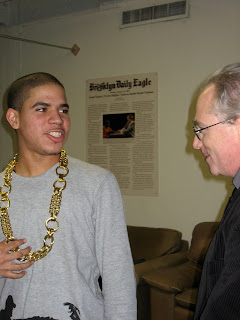
Some of our PYBY volunteers setting up the opening night reception.

Co-director Serge Velez.

Ensemble member Emily Munguia in the green room.

Emily with ensemble member Amanda Williams.

Ensemble member Francisco Espinoza.

Ensemble member Gilbert Arias with co-director Dan Friedman.

Ensemble member Eugene Clowney with co-director Brian Mullin.

Francisco with co-director Sita Sarkar.

3 comments:
OMG, i love these pics, isnt there more, you should really put more. I put some of these on my myspace lol
I was an audience member at the Castillo Theater Saturday night. I read this blog and its links prior to coming to the performance. It was great to read Langston Hughes poem again--less so, Allen Ginsberg's. Subsequently I have thought about how the cast and directors have defined the concept of "a conversation" relative to this production. Depending on what evolves from this blog it feels to me that the play might better be titled "America (our conversation)". Regardless, the conversation that was acted out was/is a good one. If only the baby boom generation would have a similar conversation about "America." If only we could have a conscious conversation about ourselves, our country, and our government (we are all living in our unconscious one!).
I have thought further about the question I raised with Gilbert, Francisco, and Marielle and whether my generation has mentored how a conversation, such as the one this play purports can happen, actually happens. I concur with their response: we have not. Maybe a corollary to Marshall McLuhan's observation that the medium is the message, is that the hearer of the message becomes the medium of the message. By this I mean that, over time, the medium defines the thinking--the neural networks--of the hearer. We become what we hear repeatedly. We become our conversation.
It is pretty easy to observe that my generation is better at broadcasting competing opinions than it is at listening ourselves into more inclusive perceptions as part of a common effort to be a more perfect, just, tranquil, secure, economically sound, and free union. To what degree has the broadcast medium and lecture-based education defined my generation's mindset? To what degree does it limit how we can think about a conversation about America? To what degree have these social practices affected for us--and through us, you--the "symbolic violence" you have discussed?
While lecture-based education is still a dominate pedagogy your generation is subjected to, the Internet is transforming the institutions of the broadcast medium. Except for Emily, all of the cast stated they have myspace pages. As co-authors of this play will this blog and/or your myspace pages be linked in some way that will invite others into the conversation that has informed what you have dramatized?
Without such interaction this play is less a conversation than it is a broadcast of a conversation; a contradiction; a tease. Ben's 1/30/07 comment that the cast was trying to perform your relationship to our society is a profound one. Will the production company find a way--and the time--to have a conversation that is more than what this performance encompasses? Can you, even without the needed mentoring, show us gray-hairs how a real conversation is effected?
With my intent being an exploration of what is possible--and as a gray-haired baby boomer--here are three questions and a reflection that I contribute to the conversation via this blog. Was the America-that-never-was-for-me closer to the reach of Americans when we were a colony with an external authority than it has been since the United States achieved self-governance? Was freedom nearer to all Americans before the radification of the 13th and 14th Amendments to the Constitution than afterwards? Defying "common sense," does the dream of America belong to a past and an experience of shared oppression which our current thinking and relationship with our self-governance preclude from becoming real?
These questions have me revisiting my attitude toward Ginsberg's "America". Why do I tend to agree with Marielle's comments about him? What is different about his upbringing that might have me not hearing him as he intends to be heard? I was educated such that I am basically ignorant of the 1,000,000 Trotskyites Allen references. I know little of the imprisonment and deportation of American anarchists by J. Edgar Hoover, starting with the Palmer Raids in the 1919, nor the chilling effect Hoover's legacy had on the "America (a conversation)" that was occurring among the American communists and socialists of Allen Ginsberg's parent's day.
His parents were youth of your age when socialism and unions were a growing social force that was finally braking the strangle hold laisse-faire capitalism had on society and government. According to Ginsberg his mother made up bedtime stories with a persistent theme of a good king riding forth from his castle, seeing suffering workers and healing them. She was active in the communist party. I contrast the message he grew up with to the story that Marielle has received from her mom. How much does what "mothers" us, like the medium, shape our thinking; shape our hearing; define the limits of our hope; inform the nature of our faith? In my family tree I have little first-hand experience with the exploitation that socialism and labor unions evolved to address. Being either descended from subsistence farmers or merchants-turned bankers/politicians from the rural state of Maine, a "Lincoln" Republican perspective shapes my thinking. I am not sure how I would think and feel if I had not been raised with the sense of privilege my "mothering" afforded me.
Allen's socialist values were not supported by the broadcast medium when he penned these lines. Competition, as a valued social narrative, was on the rise and the secular social narrative of cooperation was on the decline. Behaviorists were being trusted to define the humans condition. Abraham Maslow was developing his ethical argument for the behavorialist's view of humanity by claiming that human altruism is the result of a progressive practice of enlightened self-interest. The human tragedy of WW II was reverberating in humanity's psyche, McCarthyism was running rampant and the Cold War was becoming the framework for the conversation about America. The Lord of the Flies, then a new publication would go on to became required reading in high school in my day. The innate goodness of humanity that Allen was indoctrinated with was being culturally dismissed. Even had he not been gay during that time of acute homophobia, this lack of social support for his values that the conversation of his day represented is a significant obstacles to maintaining ones optimism. What does one stand on if what one trusts is not included in the broadcasted conversation? How can one listen if one does not feel heard?
My idealism is currently tempered by my discovery of how great my generation's capacity is to systemically avoid having the needed conversation: one that goes beyond the limitation of what constitutes a mimicking of the "communication" of broadcast medium. I buy into Ben's unity-of-all-things thing. It seems my generation isn't into thinking about the implications of such a unity on the material level. Hence it avoids the conversation . From the view of our Amerika (using a '60's spelling) being a competitive, exploitive, and extractive culture, to be able to avoid the conversation about Amerika helps reduce stress in one's life--as long as Amerika is being America for me!
Avoiding a conversation about what our economic choices are effecting environmentally, socially, and economically is stressful for me. The expenses and costs that global capitalism externalizes in its blind pursuit of short term profit are but long term "accounts payable" that are accruing to the whole planet. These past due accounts are a critical part of the deferred conversation about America. Hughes commitment to have America be the America-it-never-has-been is an answer to this irresponsibility. It is THE place to start a profound (and paradoxically) idealistic AND realistic conversation. Given this as a framework, thinking that the deferred conversation as being about America is a misnomer. In 1938 such limits might have had relevancy. Today the conversation is a conversation about the common dream of humanity. It cannot be broadcasted nor taught as belonging to a nation. We are all in this together . Any real conversation will keep us uncomfortably awake to this fact.
Do the questions I've offered these reflections on provide insights into how uncomfortable and transforming the framework of the real conversation is?
Greg, thanks for your comment. I will share it with the cast at our brush-up rehearsal and will encourage them to follow the links you provide. You provide a lot to think about (more, in fact, than I'm able to reply to at this point).
I do want to say, though, in response to your remark that our play is only a "broadcast of a conversation," that the performance is merely one part of an ongoing conversation that does indeed stretch beyond the generation of the young people in the cast (after all, Dan and myself are of different generations than the performers, and the audiences that have been responding to the show are as well). After the pay, we had a talk-back (which you attended) and after that you spoke to several cast members for quite a while in the hallway. And then you posted on the blog! I'd say that the conversation has already extended well beyond the confines of the show/the theater.
I would venture to suggest, though, that the most "revoluntionary" way for the conversation to continue would be for you to organize a simple performance of your own in response to ours. Feel free to invite in Baby Boomers or anyone else you choose, feel free to bring in some of the many texts that you've referenced in your comment, or even to include the text of our show. The performance need not be complicated or professional; we hope to make people realize that all people are able to perform. If you do this, be sure to tell us about it!
I'd love to know what a group that you might be able to organize would have to say to our young cast. Let's start a chain reaction.
Post a Comment